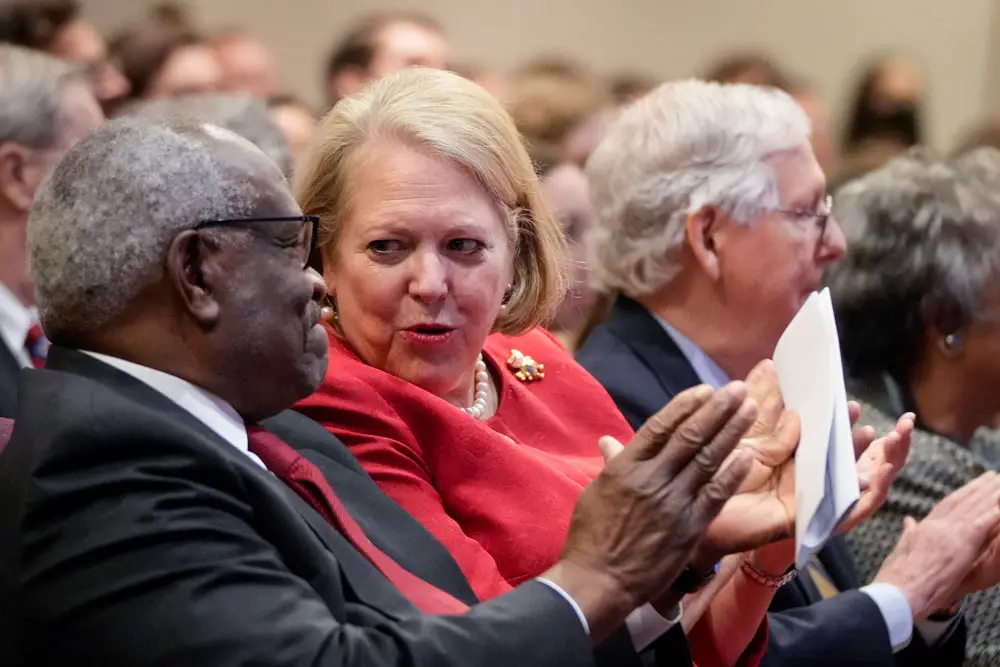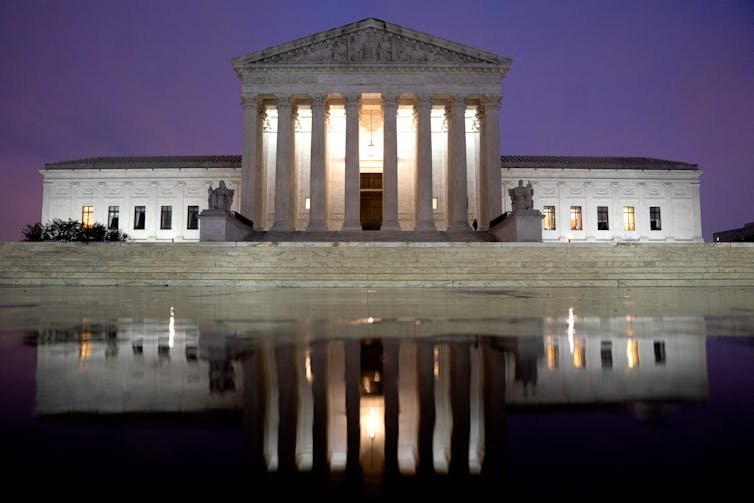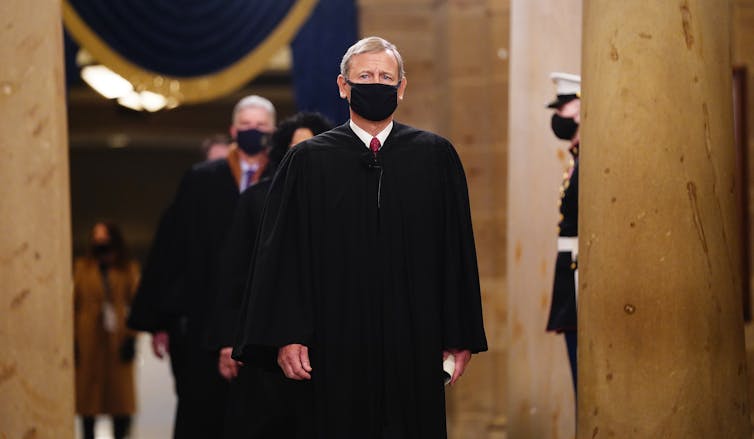
By Kevin Leske
Time and time again, the nation’s highest court has come under fire for failing to manage potentially unethical behavior by its justices.
In the past, the Supreme Court of the United States has cast aside pleas to adopt an ethics code for the justices.
Now, the actions of Justice Clarence Thomas’ wife, Virginia – who pushed the White House to overturn the 2020 presidential election – have once again thrown light onto this long-standing conflict: How accountable should the justices be?
No justice
In general, ethical behavior by judges in our federal system is governed by the Code of Conduct for United States Judges, which was adopted in 1973. The code applies to federal judges and magistrate judges serving in the courts of appeals, district courts, bankruptcy judges, the Court of International Trade and the Court of Federal Claims.
Judges cannot “allow family, social, political, financial, or other relationships to influence judicial conduct or judgment.” Such influence of conduct or judgment constitutes a conflict of interest.

Stefani Reynolds/AFP via Getty Images
Judges must not only avoid actual conflicts of interest, they must also avoid the appearance of impropriety. Thus, judges covered under the code need to recuse themselves from cases whenever their impartiality might reasonably be questioned.
Notably absent from coverage under the code are the justices of the Supreme Court of the United States.
Dead end in Congress
Acting on the assumption that it has the authority to impose rules on the justices, Congress in 1974 specifically included justices in a law requiring the disqualification of judges and magistrate judges when they engage in conduct that mirrors the types of prohibited conduct covered by the code.
Unfortunately, Congress did not include justices in the law that sets up the procedure for enforcing complaints about the judiciary and imposing discipline when a judge acts inappropriately, such as when violating the disqualification law.
Congress sought to bring attention to this gap. In 2015, bills were introduced in both the House of Representatives and the Senate that would have mandated the Supreme Court to establish a code of ethics. The House bill never made it out of committee. The Senate bill met a similar fate.
And even more recently, in 2021, a U.S. House of Representatives resolution called on the justices to subject themselves to the code or to establish their own ethical code. The resolution is a nonbinding and symbolic gesture, and its fate is unresolved, as it remains in committee.
A similar House bill also was introduced in 2021 to require the Judicial Conference of the United States, which oversees the code, to make the code applicable to justices. The House has failed to take further action on the bill.
Court doesn’t police itself

Jim Lo Scalzo-Pool/Getty Images
The debate on this issue is not academic, because the instances in which justices have recused themselves are surprisingly frequent.
For example, one judicial watchdog organization reported that in the U.S. Supreme Court’s October term of 2020 alone, justices recused themselves close to 250 times for reasons including stock ownership in a company involved in the case, previous work on the case or having been personally named in the lawsuit.
Yet despite these documented occurrences, public outcry continues when justices have declined to recuse themselves in cases in which there are strong indications that their impartiality might reasonably be questioned.
The arguments for and against more meaningful ethical rules and oversight of the justices are complex.
One view is that Congress’ imposing an ethical code on justices is not only unnecessary, but might also be unconstitutional. The argument is that because the U.S. Constitution creates the Supreme Court – as opposed to the rest of the federal courts, which are established by Congress – the direct application of a code on the justices would violate the legal doctrine requiring a “separation of powers” among the branches.
Chief Justice John Roberts asserted in 2011 that the adoption of an ethics code was unnecessary. He wrote in his annual report on the federal judiciary that justices not only consult the code “as a key source of guidance,” but also turn to numerous other authorities to govern their conduct, especially in light of unique ethical considerations presented at the Supreme Court.
For example, unlike other courts, there is no substitute justice available to fill in when a justice recuses himself or herself. Therefore, wrote Roberts, each justice cannot recuse “as a matter of convenience or simply to avoid controversy,” because litigants could be needlessly deprived of having a full court hear their case.
Finally, can the justices themselves police a fellow justice’s decision to recuse or not to recuse? That’s unlikely, wrote Roberts, because a court generally “does not sit in judgment of one of its own members’ recusal decision in the course of deciding a case.”
Likewise, because the Supreme Court is the final court in the U.S. system, there is no higher tribunal to review such decisions.
Court reform groups disagree, arguing that individual justices cannot be the sole decision-makers on whether to recuse.
In light of that, one option would to institute an ethics code with enforcement mechanisms similar to what exists under the code for lower-court judges. Greater accountability, such as publishing explanations when a justice decided to recuse or not, would also increase transparency and the public’s confidence in the Supreme Court.
Other reform advocates have gone even further to suggest a host of changes such as term limits, restriction on ownership of individual stocks, more detailed financial disclosures and increased transparency of any public appearances by the justices.
Who has the better argument?
In the end, it really boils down to how much faith the public places in the nine members of the nation’s court of last resort.
![]()
Kevin Leske is a Professor of Law at the University of Dayton.





























Sherry says
Of course Justice Thomas should have recused himself . . . in the past, and going forward. . . for any and all cases pertaining to “the Big Lie” and the “Jan. 6th Insurrection”. However, demonstrating that the Supreme Court suffers from the political divide, Justice Thomas, like many others in “political” office, has apparently thrown the idea of “ETHICS” out the window. A great example of the devastating erosion of our moral code and civilization along with our democracy!
ALL of these “culture war” battles are interconnected. VOTE! VOTE! VOTE!
The Geode says
a bigger “ethical” question is to hire somebody based solely on their race and sex to appease a political base
Sherry says
“Affirmative Action ‘ does not necessarily always mean that unqualified people are selected for positions. Such thinking is certainly biased and prejudicial, to say the least. If you are implying that Judge Brown is not qualified . . . even in this extremely divided Congress she received bi-partisan support. Here are some of her qualifications. . . take a good read:
Nan Aron, president of the liberal Alliance for Justice, spoke of Jackson’s record, saying Jackson “has written nearly 600 opinions and been reversed less than twelve times”.
After law school, Jackson served as a law clerk to judge Patti B. Saris of the U.S. District Court for the District of Massachusetts from 1996 to 1997, then to judge Bruce M. Selya of the United States Court of Appeals for the First Circuit from 1997 to 1998. She spent a year in private practice at the Washington, D.C. law firm Miller Cassidy Larroca & Lewin, then clerked for justice Stephen Breyer of the Supreme Court of the United States from 1999 to 2000.]
Jackson worked in private legal practice from 2000 to 2003, first at the Boston-based law firm Goodwin Procter from 2000 to 2002, then with Kenneth Feinberg at the law firm now called Feinberg & Rozen LLP from 2002 to 2003. From 2003 to 2005, she was an assistant special counsel to the United States Sentencing Commission. From 2005 to 2007, Jackson was an assistant federal public defender in Washington, D.C., where she handled cases before U.S. Court of Appeals for the D.C. Circuit.[24] A Washington Post review of cases Jackson handled during her time as a public defender showed that “she won uncommon victories against the government that shortened or erased lengthy prison terms”. From 2007 to 2010, Jackson was an appellate specialist at Morrison & Foerster.
U.S. Sentencing Commission
On July 23, 2009, Barack Obama nominated Jackson to become vice chair of the United States Sentencing Commission.[26] The U.S. Senate confirmed Jackson by unanimous consent on February 11, 2010. She succeeded Michael E. Horowitz, who had served from 2003 until 2009. Jackson served on the Sentencing Commission until 2014.[27][21] During her time on the Commission, it retroactively amended the Sentencing Guidelines to reduce the guideline range for crack cocaine offenses, and enacted the “drugs minus two” amendment, which implemented a two offense-level reduction for drug crimes.
District Court
Jackson on the bench of the U.S. District Court for the District of Columbia
On September 20, 2012, Obama nominated Jackson to serve as a judge for the United States District Court for the District of Columbia to the seat vacated by retiring Judge Henry H. Kennedy Jr.[29] Jackson was introduced at her December 2012 confirmation hearing by Republican Paul Ryan, a relative through marriage, who said “Our politics may differ, but my praise for Ketanji’s intellect, for her character, for her integrity, it is unequivocal.”[12] On February 14, 2013, her nomination was reported to the full Senate by voice vote of the Senate Judiciary Committee.[30] She was confirmed by the full Senate by voice vote on March 22, 2013. She received her commission on March 26, 2013[21] and was sworn in by Justice Breyer in May 2013.
During her time on the District Court, Jackson wrote multiple decisions adverse to the positions of the Trump administration. In her opinion ordering Trump’s former White House counsel Donald McGahn to comply with a legislative subpoena, she wrote “presidents are not kings”.
Sherry says
For your edification:
JACKSON WOULD BRING AN UNPARALLELED BREADTH AND DEPTH OF EXPERIENCE
Jackson would be the most experienced trial court judge to join the Supreme Court in almost a century.
Jackson served on the United States District Court for the District of Columbia for nearly 8 years, giving her more trial court experience than any sitting Supreme Court justice and more than any justice since Edward Sanford, who was nominated to the Supreme Court in 1923.
Jackson would be only the second sitting justice to serve at all three levels of the federal judiciary.
Only Justice Sonia Sotomayor has also served as a District judge, Circuit judge and Supreme Court justice.
Jackson would bring more years of experience as a judge than four of the sitting justices combined.
Jackson has more than eight years of experience as a judge; that’s more than Justices Thomas, Roberts, Kagan, and Barrett had combined when they were confirmed.
Jackson would be the first public defender to become a Supreme Court justice in the history of the Court.
She would be the first justice with substantial criminal defense experience since Thurgood Marshall retired in 1991.
JACKSON HAS WON BIPARTISAN SUPPORT AND PRAISE
Jackson has been confirmed by the Senate on a bipartisan basis three times. In 2021, Jackson was confirmed to the United States Circuit Court for the District of Columbia with the support of Republican Sens. Murkowski, Collins, and Graham.
Former Republican Speaker of the House Paul Ryan: “My praise for Ketanji’s intellect, for her character, for her integrity – it is unequivocal.”
Sen. John Cornyn (R-TX): “Very impressive background … extensive trial court experience.”
Republican-appointed judge Thomas Griffith, who supported Jackson’s elevation to the D.C. Circuit after observing her work as a judge, recently said: “Her academic record is remarkable. She has a breadth of experience, which is really quite unique.”
When Jackson was nominated to the D.C. Circuit, she received support from Supreme Court clerks for Justices Scalia, Thomas, Rehnquist, Kennedy, Souter, and O’Connor.